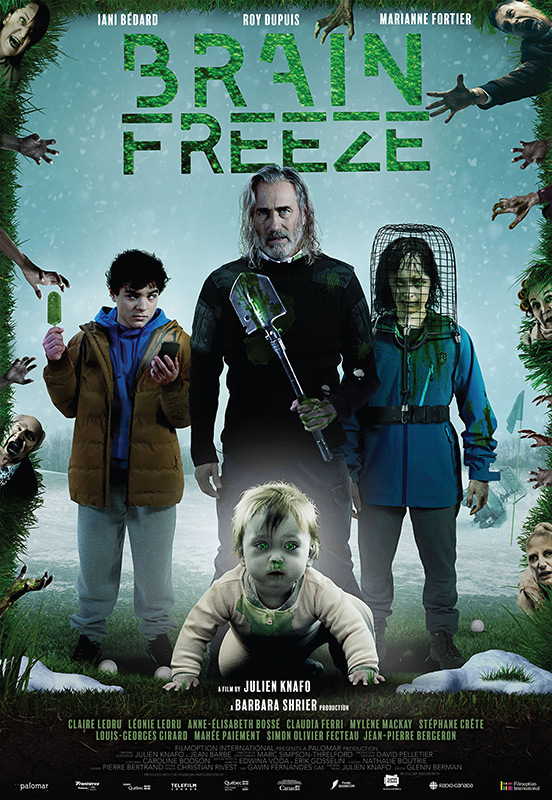2021 Festival Review – Brain Freeze

Peacock Island from the outset is drowning in its own lavishness, with grand houses and expensive (probably self-driving) cars lining the streets of this exclusive land of the side of Quebec. Money is no issue here, meaning that the regulars’ hobbies mainly include visiting the private golf club. However, with Canada’s cold winter comes mountains of snow tarnishing the precious golf course, but lucky for them a chemical has been created which eludes nature’s constitution and melts the snow, restoring the green grounds. Unbeknownst to residents, the chemical turns the local’s into ravenous zombies.

Julien Knafo brings us this socially conscious zombie extraordinaire which uses the role of a zombie to weave through a complex vision of ostracization, the division of elitism, and the overarching sense of greed amongst society. Zombies have long been used as a tool to catalyse a weighty narrative, with White Zombie (1932) being an early example, and Train to Busan (2016) proving that modern filmmakers still use the creature as a device. Joining the allegiance alongside zombie classics is Brain Freeze, which is sure to be remembered not only for its commentary, but also its sophisticated exterior that screams to be admired.

Throughout the film we are treated to a courageous set design that mainly boasts modern lushness, but all of this ‘glam’ is only an acting backdrop which juxtaposes against the braveness and ruthlessness of the characters. We follow a typical angsty teenager, André (Iani Bédard) as he has to care for his baby sister whilst outrunning the undead. In his flight he meets Dan (Roy Dupius), a security guard who frequently works on the Island. Together they form an unlikely band of fighters who vow to do whatever is necessary to survive. Whilst André is an ‘Island native’, Dan is not, instead he simply travels over the wall for work and then retreats to his small studio apartment when the day’s work ends.

What’s typical amongst many apocalypse style films (zombie or not) is that a group of survivors will naturally come from different backgrounds, and despite their differences they all abandon their intrinsic personalities and become clones of one another. I was more than pleasantly surprised to see that Knafo did not succumb to this genre conformity and instead kept André slightly conceited even in draconian times, creating a more realistic portrayal and ensuring that the film remained interesting and refreshing.

Following the amalgamation of characters and the cultural annotation is a wicked brutality that keeps an edge on the dark humour, allowing the film to avoid coming across as just another take on Shaun of the Dead (2004). The jokes are kept dry and the atmosphere although comical at times remains threatening. One of the laughable highlights is when one of the golf club members believes that a herd of angry zombies are just a group of workers who want to unionize.

This notion of keeping the film exciting and not slapstick-based is the origin story of the virus, coupled with the imagery. Despite the infestation deriving in the golf club the zombie-chemical worms its way through the grounds and into the Island’s water system, poisoning nearly the entire population Cabin Fever style. Further negotiating this essence of the earth retaliating against its abusers (who’d rather profit than let nature run its cycle) is the sci-fi elements such as the cold tonal palettes, existential dread, and an uprising of evil creatures.
As I type and as you read, the copious topics that Knafo explores combined with the forgoing plot shifts may externally replicate a film that is too mashable, yet the changes are smoothly adapted and you become so engrossed in the fates of the characters that you end up welcoming the braveness of Knafo’s filmmaking. Brain Freeze is memorable and a warming surprise to a subgenre that needs a bit of revival every now and then.
You can check out Brain Freeze on Sunday 26th September 2021 at this years fest, tickets and details here.


